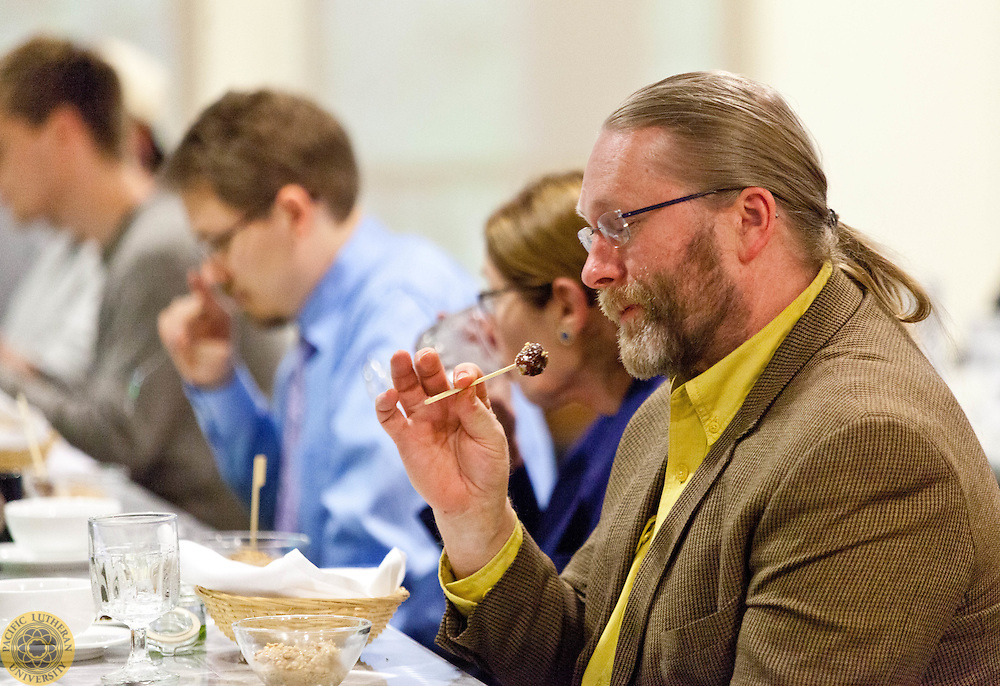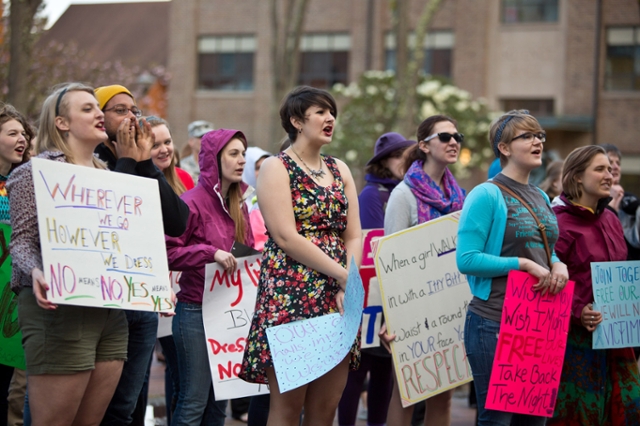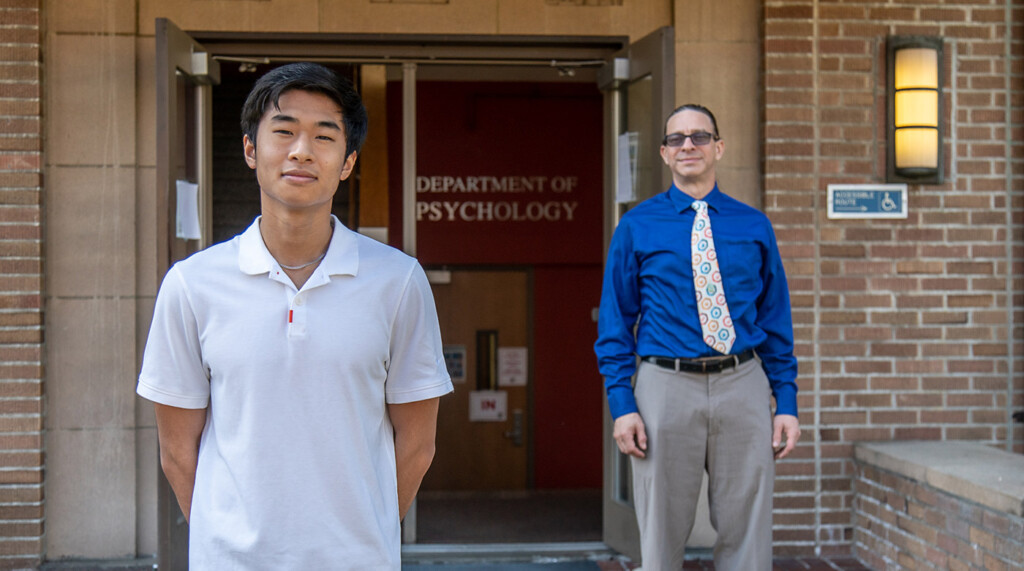Page 4 • (12,457 results in 0.042 seconds)
-

Our context: Highly secular and diverse in terms of religion, culture, and race. This context makes us work harder to define and embody Lutheran Higher Education because one cannot fall back on
religion may be a more humane one. Unlike current stereotypes about religion: PLU does not equate religious affiliation with an anti-intellectual/anti-science stance or a lack of the best, contemporary rigorous scholarship. Religious beliefs are treated with respect as valuable to the believer; Many people in our world engage the “holy” or spiritual and these are assets they bring to our educational community. Students are encouraged to bring their religious, cultural, social values and perspectives to
-

As you know, PLU went through a difficult process of prioritization this year, responding to lower enrollments and seeking to proactively budget for a sustainable future rather than wait until we reached emergency conditions. This led to hard conversations and hard choices, ultimately made by…
professions. A 2016 Classics major who is currently pursuing a Ph.D. in engineering wrote this about his degree: My Classics degree, to me, exemplifies every virtue and value of a liberal arts education, and also everything unique and exceptional about PLU as an institution. . . . By studying holistically the culture, life, and beliefs of another society, I could step outside, if only partially and momentarily, of my own cultural biases, customs, and predispositions; I think that is the epitome of what
-
Speaker: Dr. Michelle M. Jacob, PhD, is a Professor of Indigenous Studies and Director of the Sapsik’ʷałá (Teacher) Education Program in the Department of Education Studies at University of
“Indigenous Environmentalism as Spiritual Responsibility: Journeys of Activism and Healing with Saint Kateri Tekakwitha” Dr. Michelle M. Jacob, PhD, is a Professor of Indigenous Studies and Director of the Sapsik’ʷałá (Teacher) Education Program in the Department of Education Studies at University of Oregon. 7:00 pm | Tuesday, Feb 20 | Scandinavian Cultural Center Free and Open to the Public The PLU Religion Department welcomes you to the Paul O. Ingram lecture at 7p.m. Tuesday, February 20th
-

Campus Ministry Student Staff - Religious and Spiritual Diversity | Campus Ministry
Justin Singh Campus Ministry Student Staff - Religious and Spiritual Diversity
-
The Confucius Institute of the State of Washington (CIWA) aims to provide financial and other support for Chinese language and culture education.
Mission:The Confucius Institute of the State of Washington (CIWA) is committed to promoting intercultural understanding through Chinese language education, Chinese studies, educational exchanges, and community-based activities that facilitate cultural diversity across the State of Washington.CIWA:CIWA is an international partnership involving Pacific Lutheran University, Sichuan University in China, Seattle Public Schools, Chongqing Jiaotong University and The Alliance for Education. It was
Confucius Institute of the State of WashingtonHarstad Hall Offices 114 & 115 Tacoma, WA 98447-0003 -
The School of Nursing Student Rights and Responsibilities defined below support the Student Rights and Responsibilities as defined in the Pacific Lutheran University’s Student Code of Conduct.
Student Rights and Responsibilities defined below support the Student Rights and Responsibilities as defined in the Pacific Lutheran University’s Student Code of Conduct. General Principles – All students have a right to: a safe, supportive, respectful, and professional learning environment that is free from discrimination and accepting of individuals for who they are regardless of cultural/ethnic affiliation, spiritual affiliation, political affiliation, or any other personal characteristic, choice
-
The review time is typically shorter than other categories of review (~6-8 days).
reviewResearch using a wide range of methodologies can fall into this review category, including collection of data: from voice, video, digital, or image recordings made for research purposes; on individual or group characteristics or behavior (e.g., research on perception, cognition, motivation, identity, language, communication, religious or cultural beliefs or practices, and social behavior); from surveys, interviews, oral histories, focus groups, program evaluation, or human factors evaluation; and/or
-

Participants at the the 2014 Take Back The Night rally, which focuses on the issue of assault prevention. (John Froschauer, PLU Photographer) Continuing the Conversation: Reaction to Obama Administration Report on Sexual Assault on College Campuses PLU leads the way with innovative programs and outreach…
Students. “Each summer, we review our existing student conduct policies and programs. This summer’s review will include the recommendations published by the Obama Administration as well,” she said. Warwick said one place to start with improvements might be taking another campus climate survey so the campus can program and intervene effectively with students. The last climate survey—looking at commonly held beliefs of students, and barriers to reporting—was done in 2007. Even before the report, the
-

As the world was beginning to realize the enormity of COVID-19, two Pacific Lutheran University professors seized the 2020 moment to do significant research into the psychology of the pandemic. PLU Department of Psychology Chair Jon Grahe and his Statistics 232 students conducted a U.S.…
Department of Psychology Chair Jon Grahe and his Statistics 232 students conducted a U.S. study regarding general attitudes, beliefs, and behaviors as they related to COVID. They recently completed a paper with a first student author that is under review and are working on two more with students as first authors. They currently are conducting a one-year follow-up on last year’s survey and anticipate additional paper submissions. Additionally, Assistant Professor of Psychology Corey Cook and some of his
-

As the world was beginning to realize the enormity of COVID-19, two Pacific Lutheran University professors seized the 2020 moment to do significant research into the psychology of the pandemic. PLU Department of Psychology Chair Jon Grahe and his Statistics 232 students conducted a U.S.…
Department of Psychology Chair Jon Grahe and his Statistics 232 students conducted a U.S. study regarding general attitudes, beliefs, and behaviors as they related to COVID. They recently completed a paper with a first student author that is under review and are working on two more with students as first authors. They currently are conducting a one-year follow-up on last year’s survey and anticipate additional paper submissions. Additionally, Assistant Professor of Psychology Corey Cook and some of his
Do you have any feedback for us? If so, feel free to use our Feedback Form.


